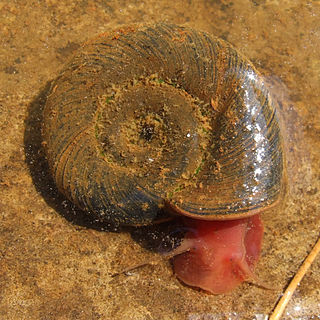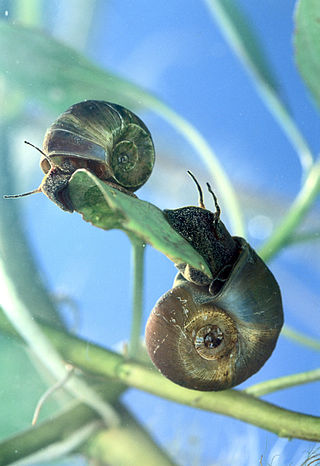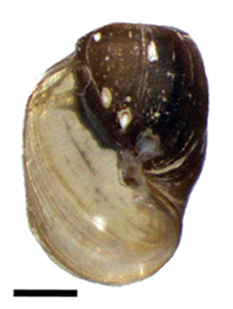
Planorbidae, common name the ramshorn snails or ram's horn snails, is a family of air-breathing freshwater snails, aquatic pulmonate gastropod molluscs. Unlike most molluscs, the blood of ram's horn snails contains iron-based hemoglobin instead of copper-based hemocyanin. As a result, planorbids are able to breathe oxygen more efficiently than other molluscs. The presence of hemoglobin gives the body a reddish colour. This is especially apparent in albino animals.

Planorbis is a genus of air-breathing freshwater snails, aquatic pulmonate gastropod molluscs in the family Planorbidae, the ram's horn snails, or planorbids. All species in this genus have sinistral or left-coiling shells.

Planorbarius corneus, common name the great ramshorn, is a relatively large species of air-breathing freshwater snail, an aquatic pulmonate gastropod mollusk in the family Planorbidae, the ram's horn snails, or planorbids, which all have sinistral or left-coiling shells.

Planorbis planorbis is a species of air-breathing freshwater snail, an aquatic gastropod mollusk in the family Planorbidae, the ram's horn snails.

Planorbella trivolvis is a species of freshwater air-breathing snail, an aquatic pulmonate gastropod mollusk in the family Planorbidae, the ram's horn snails, or planorbids, which all have sinistral or left-coiling shells.

Physella acuta is a species of small, left-handed or sinistral, air-breathing freshwater snail, an aquatic gastropod mollusk in the family Physidae. Common names include European physa, tadpole snail, bladder snail, and acute bladder snail. In addition, Physa acuta, Physa heterostropha and Physa integra are synonyms of Physella acuta.
Planorbis corinna is a species of minute, air-breathing freshwater snail, an aquatic pulmonate gastropod mollusc, or micromollusc in the family Planorbidae, the ram's horn snails, or planorbids. All planorbids have sinistral or left-coiling shells.
Ceratophallus kisumiensis is a species of freshwater air-breathing snails, aquatic pulmonate gastropod mollusks in the family Planorbidae, the ram's horn snails, or planorbids. All species in this genus have sinistral or left-coiling shells.
Ceratophallus socotrensis is a species of freshwater air-breathing snails, aquatic pulmonate gastropod mollusks in the family Planorbidae, the ram's horn snails, or planorbids. The snails in this species have sinistral or left-coiling shells. This species is endemic to Socotra, Yemen.
Glyptophysa is a genus of medium-sized sinistral (left-handed) air-breathing freshwater snails, aquatic pulmonate gastropod mollusks in the family of Planorbidae.
Miratesta celebensis is a species of freshwater air-breathing snails, aquatic pulmonate gastropod mollusks in the family Planorbidae, the ram's horn snails, or planorbids. Like all other planorbids it has a sinistral or left-coiling shell.
†Neoplanorbis carinatus was a species of air-breathing freshwater snail, an aquatic pulmonate gastropod mollusk in the family Planorbidae, the ram's horn snails.

Neoplanorbis is a genus of small, freshwater, air-breathing snails. They are aquatic pulmonate gastropod mollusks in the family Planorbidae, the ram's horn snails.
†Neoplanorbis smithi was a species of small freshwater snail, an aquatic gastropod mollusk in the family Planorbidae, the ramshorn snails. This species was endemic to the United States; it is now extinct. The shells of this species appear to be dextral in coiling, but as is the case in all planorbids, the shell is actually sinistral. In life the shell was carried upside down with the aperture on the right, and this makes it appear to be dextral.

Neoplanorbis tantillus is a species of very small air-breathing freshwater snail, an aquatic gastropod mollusk in the family Planorbidae, the ram's horn snails. This species is endemic to the United States. In 2012, it has been declared extinct by the IUCN Red List of Threatened Species.
† Neoplanorbis umbilicatus was a species of air-breathing freshwater snail, an aquatic pulmonate gastropod mollusk in the family Planorbidae, the ram's horn snails.

Biomphalaria tenagophila is a species of air-breathing freshwater snail, an aquatic pulmonate gastropod mollusk in the family Planorbidae, the ram's horn snails.

Franz Martin Hilgendorf was a German zoologist and paleontologist. Hilgendorf's research on fossil snails from the Steinheim crater in the early 1860s became a palaeontological evidence for the theory of evolution published by Charles Darwin in 1859.

Amerianna carinata is a species of freshwater air-breathing snails, aquatic pulmonate gastropod mollusks in the family Planorbidae, the ram's horn snails, or planorbids. Like all other planorbids it has a sinistral or left-coiling shell.
Bayardella is a genus of small, neritiform cylindrical shelled gastropods belonging to the family Planorbidae. They are native and endemic to Australia. Species of Bayardella, like other Planorbids, are non-operculate.









